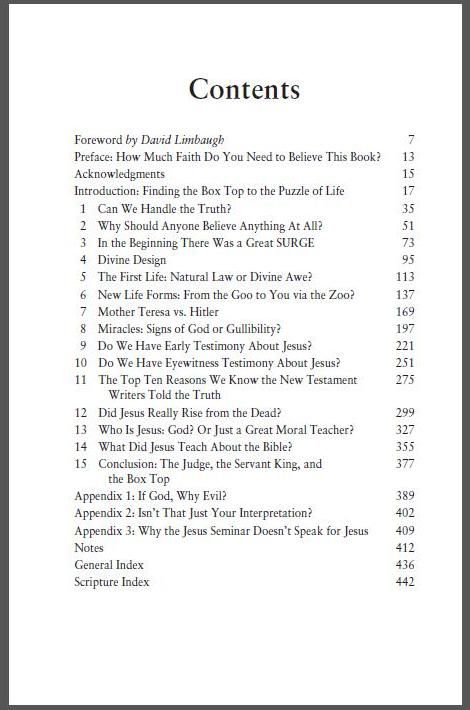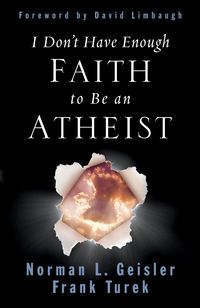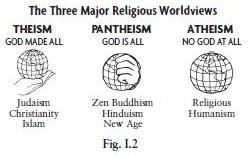I'm going to go out on a limb here and assume that if you are reading my blog, you are most likely already familiar with Apologia Educational Ministries. One of the big dogs when it comes to homeschool curricula, we have used a boatload of Apologia materials over the course of our 8 years of homeschooling. From their Exploring Creation Science series to their What We Believe series, Apologia has never let us down.
Apologia recently sent me I Don't Have Enough Faith to be an Atheist by Norman L. Geisler and Frank Turek to review. And let me just say, that by the time I had read through the introduction I had already posted three quotes from the book on Facebook and was concerned that perhaps I didn't have enough highlighters in the house to make it through the entire book.
Oh yes, it is that good.
The authors begin by describing the "Three Major Religious Worldviews" above. Regardless of where a person falls, each of these worldviews require faith from the individual. No one can know for certain, based solely on scientific knowledge which of these worldviews are true. So one might raise the question, which worldview requires a bigger leap of faith? I would venture to guess that most of our modern society would claim that a theistic belief would require the biggest leap of faith...but they haven't yet read this book.

Above you will see the chapter headings, but really the contents of this book is based around the following 12 ideas:
1. Truth about reality is knowable.
2. The opposite of true is false.
3. It is true that a theistic God exists. This is evidenced by the:
a. Beginning of the universe (Cosmological Argument)
b. Design of the universe (Teleological Argument/Anthropic Principle)
c. Design of Life (Teleological Argument)
d. Moral Law (Moral Argument)
4. If God exists, then miracles are possible.
5. Miracles can be used to confirm a message from God.
6. The New Testament is historically reliable. This is evidenced by:
a. Early testimony
b. Eyewitness testimony
c. Uninvented (authentic) testimony
d. Eyewitnesses who were not deceived
7. The New Testament says Jesus claimed to be God.
8. Jesus' claim to be God was miraculously confirmed by:
a. His fulfillment of many prophecies about himself;
b. His sinless life and miraculous deeds;
c. His prediction and accomplishment of his resurrection.
9. Therefore, Jesus is God.
10. Whatever Jesus (who is God) teaches is true.
11. Jesus taught that the Bible is the Word of God.
12. Therefore, it is true that the Bible is the Word of God (and anything opposed to it is false).
As you can see, each argument steps logically into the next. And each argument is thoroughly examined and explained often taking a chapter or more of this 430+ page text. I'm not going to lie...this is meaty stuff. But it's not boring stuff. The authors often include personal stories of defending their faith and they also point out common arguments that are made against the Christian worldview and answer them.
So who is this book for? I would say it is absolutely for the seeker and the critic. But perhaps most importantly, it is for every believer. 1 Peter 3:15 tells us, "But in your hearts set apart Christ as Lord. Always be prepared to give an answer to everyone who asks you to give the reason for the hope that you have."
Geisler and Turek put it this way...
"Furthermore, contrary to popular belief, Christians are not supposed to "just have faith". Christians are commanded to know what they believe and why they believe it. They are commanded to give answers to those who ask (1Peter3:15), and to demolish arguments against the Christian faith (2Cor.10:4-5). Since God is reasonable(Isa.1:18) and wants us to use our reason, Christians don't get brownie points for being stupid. In fact, using reason is part of the greatest commandment, which according to Jesus, is to "Love the Lord your God with all your heart and with all your soul and with all your mind" (Matt.22:37)"
I also received a copy of the I Don't Have Enough Faith to be an Atheist Curriculum Workbook. As a mother, I am so excited about this gem. Not only is this workbook perfect for any adult who is wanting to really delve into the meaty material of the book, but the supplemental material, study questions, and additional activities are the perfect companion to make this a wonderful high school study course. As a matter of fact, I can't think of a more important topic of study for my high school age students than this when the time comes. "I have no greater joy than to hear my children walk in the truth." ~ 3 John:1:4
The recommendation is for students to take approximately 2-3 weeks to read each chapter of the book and complete the curriculum assignments. At that pace, students will finish the course in about 9 months. The study questions are designed to make the student truly think about the material they read and how it relates to their life. Take a look at the very first study questions for just the introduction:
1. Based on the information you've read and seen so far, how would you define the meaning of life?
2. Without God, does life have any ultimate meaning? Why or why not?
Wow. These are serious questions that deserve serious contemplation. But I think there are many people who don't contemplate them and that is not only a shame, but it will have everlasting consequences on their eternity if they don't. I want my high school students to be thinking through these things.
Also, included in the Curriculum Workbook are fascinating page-long biographies of historical people giving insight into the beliefs of many of them who are quoted and discussed in the book. These include Carl Sagan, C. S. Lewis, Albert Einstein, Charles Darwin, and so many more.
1. Based on the information you've read and seen so far, how would you define the meaning of life?
2. Without God, does life have any ultimate meaning? Why or why not?
Wow. These are serious questions that deserve serious contemplation. But I think there are many people who don't contemplate them and that is not only a shame, but it will have everlasting consequences on their eternity if they don't. I want my high school students to be thinking through these things.
Also, included in the Curriculum Workbook are fascinating page-long biographies of historical people giving insight into the beliefs of many of them who are quoted and discussed in the book. These include Carl Sagan, C. S. Lewis, Albert Einstein, Charles Darwin, and so many more.
My oldest is just now in 6th grade, so I haven't handed this off to him yet. Not wanting to to mark up the curriculum, as I will absolutely be using this with our children in the future, I have been reading about 3 chapters a week along with the corresponding material in the workbook. I wanted to get a good feel for the book before writing the review, but I have not wanted to rush through the material. Each chapter is rich with information that every Christian...no, every person should be armed with. I appreciate having this resource for my children to use in the future, but also I am thrilled to have the material for myself now. I know that is is stengthening my own faith and is a great tool to help make me bolder in defending it.
I Don't Have Enough Faith to be an Atheist is $16 and the workbook is $33. You can read more reviews of these products at the Schoolhouse Review Crew Blog.






No comments:
Post a Comment